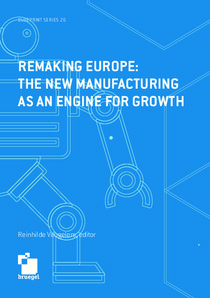Remaking Europe: the new manufacturing as an engine for growth
"Manufacturing once provided Europe with many jobs that did not require high skills. The idea that such jobs can be revived is a central issue for many politicians and is behind the demand that products should be ‘made in’ the countries that consume them. But such rhetoric has as its reference...
| Main Author: | |
|---|---|
| Institution: | ETUI-European Trade Union Institute |
| Format: | TEXT |
| Language: | English |
| Published: |
Brussels
2017
Bruegel |
| Subjects: | |
| Online Access: | https://www.labourline.org/KENTIKA-19394190124911123729-Remaking-europe-the-new-manufa.htm |
| Summary: | "Manufacturing once provided Europe with many jobs that did not require high skills. The idea that such jobs can be revived is a central issue for many politicians and is behind the demand that products should be ‘made in’ the countries that consume them. But such rhetoric has as its reference point an old version of manufacturing, which has been supplanted by complex value chains and is highly automated and data driven. This new version of manufacturing also needs attention from politicians, but for different reasons than the provision of millions of old-style production-line jobs.
The policy discussion on the future of manufacturing requires an understanding of the changing role of manufacturing in Europe’s growth agenda. Europe needs to know how it can realise the potential for industrial rejuvenation. How well are European firms responding to the new opportunities for growth, and in which global value chains are they developing these new activities? Does Europe have the right conditions for its economies to create and capture value from the activities that contribute most strongly and sustainably to Europe’s growth and external competitiveness? This Blueprint helps to provide some of the answers. The evidence in this volume shows that the challenge for European policymakers is how to promote and attract those high-value added activities within global chains that are the basis for sustainable growth and competitiveness. Such activities are not necessarily production related, but will increasingly have service-like characteristics and do not necessarily require all the activities of the whole value chain to be located at home." |
|---|---|
| Physical Description: | 250 p. Digital |

